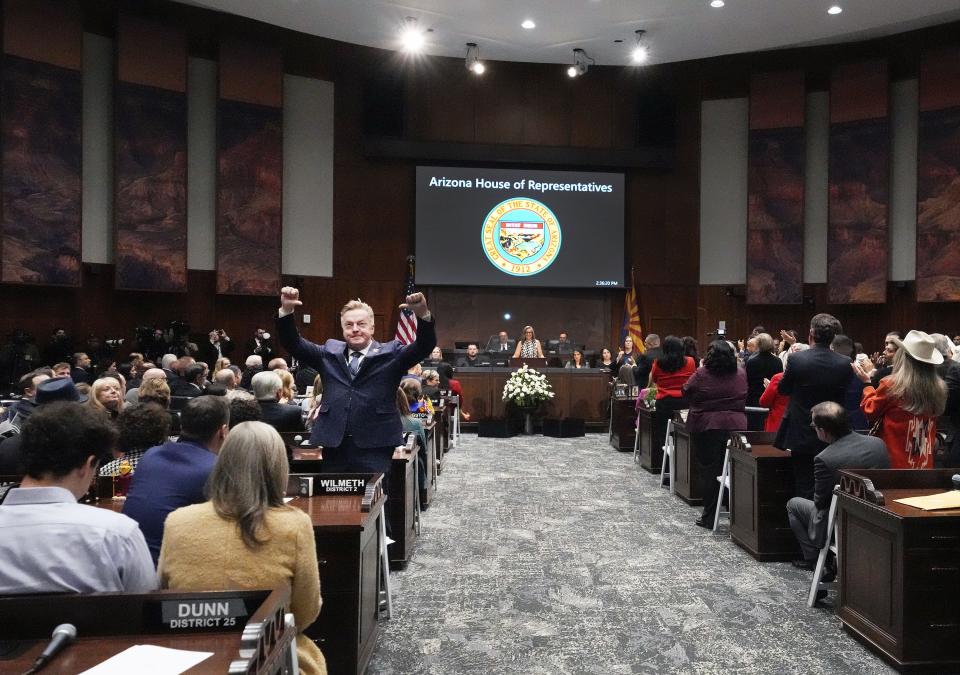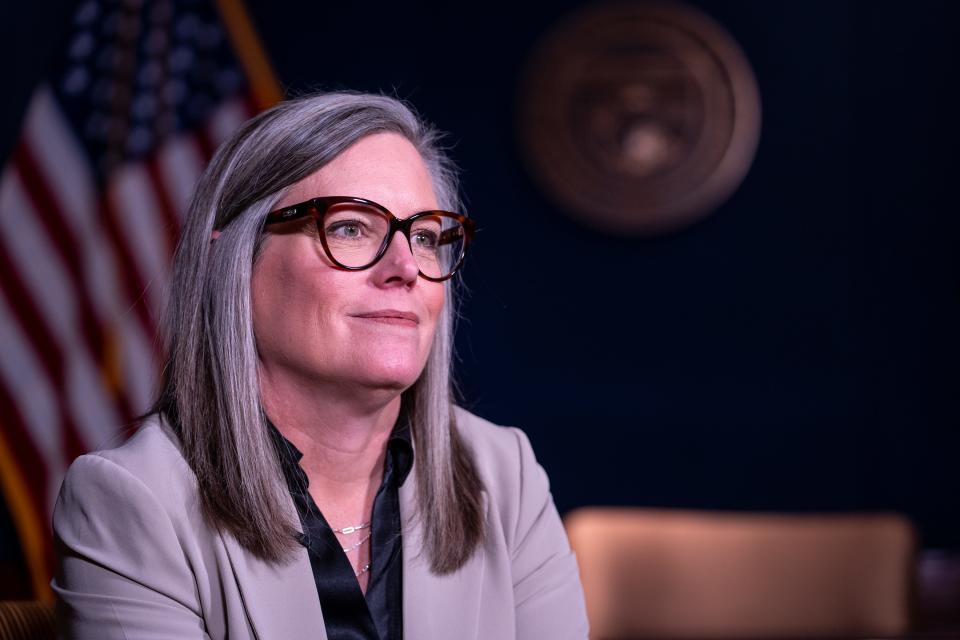Arizona State of the State: Gov. Katie Hobbs highlights areas for bipartisan wins
- Oops!Something went wrong.Please try again later.
Arizona Gov. Katie Hobbs on Monday outlined a sweeping list of priorities for her second year in office during a State of the State address that called for bipartisan action on water and housing affordability.
The Democratic governor’s second State of the State, an annual address to lawmakers that offers a roadmap of her policy goals for the year ahead, was both a victory lap of wins from her first year in office and an optimistic call for bipartisanship.
“We have worked together, debated each other, pushed one another, and, most importantly, put aside our differences when it mattered most to do what’s right for Arizona and the people who call it home," she said in the roughly 45-minute address. “Now, I think we can all agree it certainly hasn’t been easy. But our constituents didn’t send us here to the Capitol to solve easy problems or take the easy way out.”
The address reflected a more strategic approach to policymaking from the governor who now has a year of divided government under her belt.
Hobbs appealed to Republicans who control the Legislature, turning early in the speech to a criticism of the federal government’s “failure to secure our southern border” and a call for more funding to support law enforcement and humanitarian groups at the Mexican border. In doing so, Hobbs joined a common refrain from past Arizona governors of both parties.
And while still criticizing the cost of the state’s private school voucher program and calling for accountability as she did last year, Hobbs this year has detailed a multi-prong plan for how she wants to add that oversight and limit eligibility. Last year, she called to eliminate universal eligibility, a bold but unattainable goal from the outset given the partisan divides at the Capitol.
Republicans were at times openly hostile during Hobbs’ first year, blocking many of her cabinet nominees and belittling her ample use of the veto stamp – so much, that Hobbs set a single-year record. But underpinning her confidence is experience won in that tumultuous first year.
Hobbs told The Arizona Republic in an interview before the speech she also had a longer “runway” to prepare for 2024, a time in which she beefed up her legislative team and worked to improve communications with lawmakers, both Democrats and Republicans.
While the governor won standing ovations from a couple of GOP lawmakers, including Rep. Matt Gress of Phoenix, on issues like improving teacher pay, the Republicans' response was generally cold.
“You could just tell that she is going to be facing some headwinds at the Legislature with her agenda, just with the response from the majority party, but I think there are going to be some areas where we can work together," Gress said.
State Sen. Anthony Kern, R-Glendale, turned his back on Hobbs several times during the speech, as he did last year, including when she discussed protecting abortion access. As Hobbs criticized the state's private school voucher program, he gave two thumbs down.

Hobbs' hopes of bipartisanship may only go so far. Senate President Warren Petersen, R-Gilbert, and House Speaker Ben Toma, R-Glendale, gave brief opening remarks before Hobbs' speech, which observers said had not occurred before. Both pledged any attempt to change the state's voucher program, known as Empowerment Scholarship Accounts or ESAs, would not get support from their members.
“She has picked a few fights that she’s not going to win,” Toma said later about her statements on the program. “I made it pretty clear from the beginning on ESAs, that’s just not going to happen at this point.”
Address outlines policy goals, proposes areas of bipartisan cooperation
In her speech, Hobbs focused on water, mortgage assistance and prescription price reform as policies where she sees potential bipartisan support.
On water, Hobbs announced steps that could lift the “pause” she imposed in June on home development in the metro area’s far-flung eastern and western suburbs. Hobbs said she had directed the Arizona Department of Water Resources to start a rulemaking process that will allow water providers and communities to find new water sources, other than groundwater, to meet the state’s requirements to provide a 100-year water supply when it comes to new home development. That is called the Alternative Designation of Water Resources program and is one of several solutions proposed by Hobbs’ water policy council.
“Let us remember that water and drought do not care about party registration or job titles or whether you live in an urban or rural community," Hobbs said. "We can only protect our water supply by working together. I stand ready to work with you to pass legislation that makes the changes we need today – all to safeguard Arizona’s water for tomorrow. And to those who have spent years refusing to act: if you don’t, I will.”
The policy move might quell concerns from people like Petersen, who has questioned why the state has a 100-year assured water supply, while states such as California have a 25-year standard.
Hobbs said in an interview she has no intent to change the 100-year standard that applies in Arizona’s metro areas.
“I certainly don’t intend, pardon the pun, to water down the assured water supply,” she told The Republic. Hobbs added Petersen’s concerns gave her an opportunity to tell him: “Don’t California my Arizona,” a phrase Republicans often use to criticize progressive policies.
On housing, Hobbs proposed state assistance to help middle-to-lower-income Arizonans with down payments, as well as provide relief from mortgage interest rates. Those would be available to families of four who make up to $75,000 a year.
Another proposal targets rural Arizona, with the state’s Industrial Development Agency providing financial assistance to 200 households to get into mortgages with a lower interest rate.
“These are good, tangible steps to creating access to housing at affordable prices – but they alone will not solve the crisis across our state," the governor said. "I look forward to working with any member of this Legislature to find innovative and effective solutions to help Arizonans access the homes they and their loved ones need to thrive.”
Hobbs unveiled a plan to prevent pharmacy benefit managers, who act as middlemen, from charging more than the cost of filling and dispensing a prescription. Democratic Attorney General Kris Mayes in November sued those managers as well as pharmaceutical makers for violating the state’s Consumer Fraud Act by inflating the price of insulin and other diabetes drugs.
Hobbs also wants to create a new division of the state Department of Insurance and Financial Institutions to cap prices on commonly used drugs, such as insulin.
Responding to accounts of maltreatment and deaths at sober living and long-term care homes, Hobbs proposed more accountability for those facilities. She called on lawmakers to toughen penalties and increase standards for those facilities.
Hobbs said she will push a package of bills that bar facilities from erasing their complaint record by transferring ownership, standardize inspections, and wants to give the Department of Health Services the ability to levy fines based on the severity of an offense, as opposed to an arbitrary cap.
What was not in the speech
Hobbs spent the vast majority of her first State of the State discussing education. This year, K-12 funding got what amounted to a passing reference. That’s likely due to the state’s financial outlook, which makes a funding boost unlikely.
Hobbs said the state “must seize the opportunity as our budget outlook improves in future years” to strengthen programs that provide scholarships for low-income students and allow them to receive college credits.
Hobbs signaled she would support continuing Proposition 123, which draws on state trust land revenue to funnel more money to public education and expires in 2025. But she hinted she would not support a plan proposed by Republicans who want to renew that measure and use the money it generates to cover $4,000 teacher pay raises.
“Without question, we must give teachers a raise but we must also hear the Arizonans asking us to do more,” she said, citing a need to increase compensation for support staff and increase funding for school safety.

Instead, Hobbs proposed beginning a new engineering-focused medical school at Arizona State University, doubling the size of University of Arizona medical schools, and starting a new medical school at Northern Arizona University that will focus on serving rural and tribal communities.
Hobbs is under pressure from mayors to restore funding from rental tax revenue they lost as part of an agreement Hobbs made in exchange for passage of Proposition 400, a transportation tax renewal that will go to Maricopa County voters next year. The governor did not address that in her speech, though a budget proposal she is slated to outline on Friday could address this and other funding issues in more detail.
And in recent weeks, county elections officials have pressed for changes to the state’s automatic recount law, which risks slowing ballot counting to the point that Arizona’s presidential electors may not be certified in time to meet the deadline to cast Arizona’s votes for president.
Hobbs did not address that in her speech, nor mention elections at all. But she told The Republic there were ongoing negotiations on the topic of recount deadlines. She declined to give specifics but said it needs to be a “clean” bill without other election-related matters attached to it.
Second year presents unique challenges
While she is hoping for bipartisanship, Hobbs at the same time is continuing her efforts to flip control of the Legislature to Democrats in the 2024 election.
She acknowledges the two disparate paths — advocating bipartisanship while pushing for a Democratic legislative majority. But she is sticking to her stance that there is room to work together.
And there is the state budget, which is currently running a $400 million deficit and faces a $450 million deficit next year.
Hobbs agreed with GOP leaders that cuts are inevitable, given the state Constitution requires a balanced budget. The state can close those deficits by rolling back some of the one-time funding that was approved last year as lawmakers spent down the state’s $2.5 billion surplus, as well as projects that have not yet launched.
Her priority, she said, will be protecting state agency funding.
“We will rein in wasteful spending without sacrificing public safety and public education,” Hobbs said. “We will establish guardrails on unaccountable programs without hurting hard-working families. And we will tighten our collective belts through increased efficiencies and innovation without gutting programs that support small businesses, seniors, and those in need.”
Hobbs ended the speech with the same words used to close the address in her first year: “Let’s get to work.”
Reach the reporter at maryjo.pitzl@arizonarepublic.com or at 602-228-7566 and follow her on Threads as well as on X, the platform formerly known as Twitter @maryjpitzl. Reach reporter Stacey Barchenger at stacey.barchenger@arizonarepublic.com or 480-416-5669.
Support local journalism. Subscribe to azcentral.com today.
This article originally appeared on Arizona Republic: Arizona State of the State: Hobbs targets water, drug prices, housing

